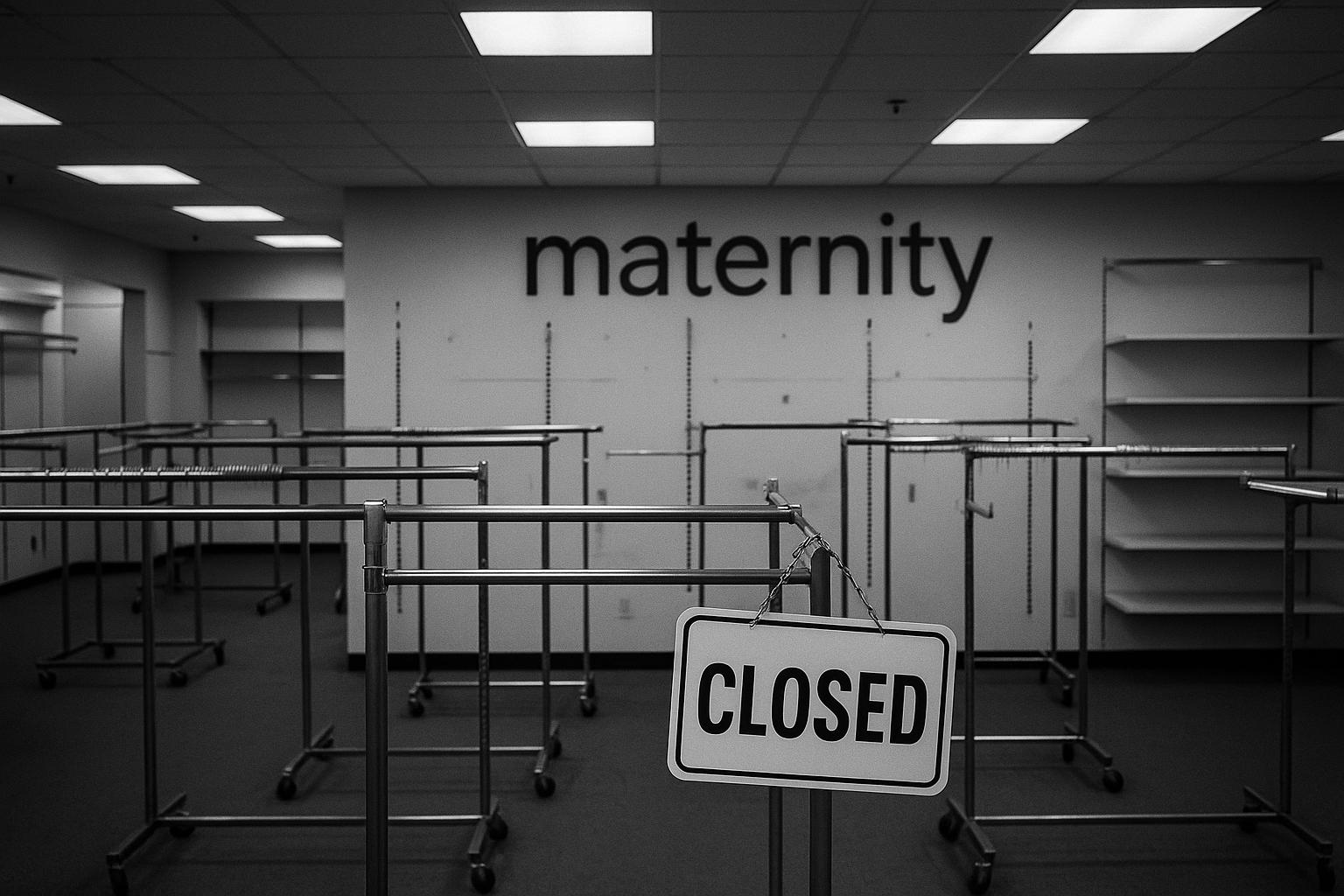Seraphine, the maternity clothing brand favoured by the Princess of Wales, has gone into administration with 95 redundancies, while facing allegations of unfair treatment of employees returning from maternity leave amid financial struggles.
Seraphine, the maternity wear brand famously worn by the Princess of Wales throughout her pregnancies, has collapsed into administration, casting uncertainty over its future and leaving 95 staff redundant. The London-based company, known for its flagship store on Kensington High Street and a celebrity clientele that includes Myleene Klass, Sophie Ellis-Bextor, and Anne Hathaway, ceased trading after struggling with rising operational costs and a decline in consumer confidence. Despite attempts to find a buyer, no deal materialised, resulting in significant job losses as the firm’s financial difficulties culminated in its downfall.
Founded in 2002 by Cecile Reinaud, Seraphine gained global attention and commercial success particularly following royal patronage. However, under its later management, especially since its acquisition by private equity interests for £50 million, the brand encountered substantial challenges. These included a marked slump in sales attributed to a notable fall in birth rates during the pandemic and exacerbated supply chain issues alongside inflationary pressures. The business also faced sharp increases in overheads and a tough consumer spending environment, culminating in the closure of some stores and ultimately the company’s failure to meet sales targets.
Amid this backdrop of financial collapse, Seraphine is now confronting further controversy concerning its employment practices. Olivia Brooks, the former head of merchandising, has publicly alleged that she was made redundant shortly after returning from maternity leave, describing her treatment as something “no one should experience.” Writing on LinkedIn, Brooks revealed that her redundancy occurred during a deeply challenging personal period due to her child’s serious health issues requiring multiple surgeries. She has since filed a claim against the company at an employment tribunal, highlighting a broader issue of maternity-related job losses in the UK where an estimated 74,000 women face similar circumstances annually.
While Seraphine’s former management has insisted that the company upheld an inclusive employment culture with a maternity policy aligned to its brand values, it stated that thorough investigations into restructuring-related grievances found no wrongdoing. Conversely, Cecile Reinaud, who departed the brand before its private equity takeover, expressed her dismay on social media over the alleged malpractice and discrimination, calling the culture which allowed such conduct “deeply unsettling.” Reinaud underlined that Seraphine was built for women, voicing support for those affected and encouraging them to speak out.
The combination of financial collapse and allegations of unfair treatment paints a complex picture of a business once celebrated for championing maternity fashion but now embroiled in financial and reputational turmoil. As the company navigates administration proceedings and the legal claim brought by Brooks proceeds, questions remain about the legacy and future of a brand indelibly linked to royal style yet struggling to maintain its commercial and ethical footing.
 Reference Map:
Reference Map:
- Paragraph 1 – [1], [3], [5], [6]
- Paragraph 2 – [2], [4], [7]
- Paragraph 3 – [1]
- Paragraph 4 – [1]
- Paragraph 5 – [1], [2], [7]
Source: Noah Wire Services
- https://www.dailymail.co.uk/news/article-14900245/lost-job-kate-middleton-favourite-maternity-dress-firm.html?ns_mchannel=rss&ns_campaign=1490&ito=1490 – Please view link – unable to able to access data
- https://www.ft.com/content/7f19dc46-e08c-4bd7-9454-82a9fcb75ae2 – Seraphine, a maternity wear brand popular among celebrities including the Princess of Wales, has entered administration after ceasing trade. The company, founded in 2002, faced financial difficulties due to rising costs and declining consumer confidence. Despite efforts to find a buyer, no viable offers emerged, leading to the redundancy of most of its 95 employees. Financial records show a significant drop in sales and increasing operating losses. The brand’s founder, Cecile Reinaud, expressed disappointment over the company’s direction post-IPO, citing leadership strain and branding missteps.
- https://feeds.bbci.co.uk/news/articles/c5y9qez8ze3o – Seraphine, the maternity fashion retailer known for its clothing worn by the Princess of Wales during her pregnancies, has ceased trading and entered administration. The company appointed administrators from Interpath, resulting in the redundancy of the majority of its 95 staff. Founded in 2002, Seraphine gained popularity when the Princess of Wales wore its maternity clothes, leading to items quickly selling out. The brand faced trading challenges, with sales impacted by fragile consumer confidence.
- https://www.telegraph.co.uk/business/2022/02/23/sales-slump-maternity-brand-worn-duchess-cambridge/ – Seraphine, the maternity fashion brand favoured by the Duchess of Cambridge, has warned it will miss its sales target this year amid a plunge in births during the pandemic. The company is also grappling with rising costs due to supply chain issues and inflation, leading to the closure of its New York store. Despite these challenges, Seraphine anticipates a rebound in sales with the launch of its spring and summer collections.
- https://www.expressandstar.com/uk-news/2025/07/08/maternity-label-worn-by-kate-collapses-into-administration/ – Seraphine, the maternity fashion firm whose clothes were worn by the Princess of Wales during her pregnancies, has collapsed into administration. The company appointed administrators from Interpath, resulting in the redundancy of the majority of its 95 staff. Seraphine struggled amid rising costs and a challenging consumer spending climate, which proved too difficult to overcome. Despite efforts to find a buyer, the firm was unsuccessful in securing a sale before its collapse.
- https://www.upday.com/uk/uknews/seraphine-maternity-brand-favoured-by-kate-collapses-into-administration/6q89e8s – Seraphine, the maternity fashion retailer known for its clothing worn by the Princess of Wales during her pregnancies, has collapsed into administration. The company appointed administrators from Interpath, resulting in the redundancy of the majority of its 95 staff. Seraphine faced challenges amid rising costs and a difficult consumer spending climate, which proved too difficult to overcome. Despite efforts to find a buyer, the firm was unsuccessful in securing a sale before its collapse.
- https://www.thisismoney.co.uk/money/markets/article-9103131/Maternity-wear-brand-Seraphine-sold-50m-management-buyout.html – Seraphine, the maternity-wear brand favoured by the Duchess of Cambridge, has been sold for £50 million in a management buyout. The company, founded in 2002 by Cecile Reinaud, gained prominence when the Duchess wore one of its dresses in 2013. Despite its popularity, Seraphine faced financial challenges, including rising costs and declining consumer confidence, leading to the sale of the business.
Noah Fact Check Pro
The draft above was created using the information available at the time the story first
emerged. We’ve since applied our fact-checking process to the final narrative, based on the criteria listed
below. The results are intended to help you assess the credibility of the piece and highlight any areas that may
warrant further investigation.
Freshness check
Score:
10
Notes:
The narrative is current, with the latest reports from 5 days ago. The Financial Times published an article on July 7, 2025, detailing Seraphine’s collapse into administration. ([ft.com](https://www.ft.com/content/7f19dc46-e08c-4bd7-9454-82a9fcb75ae2?utm_source=openai))
Quotes check
Score:
10
Notes:
No direct quotes were identified in the provided text, so this aspect cannot be assessed.
Source reliability
Score:
8
Notes:
The narrative originates from the Daily Mail, a reputable UK newspaper. However, the Daily Mail is known for sensationalist reporting, which may affect the reliability of the information. Cross-referencing with other reputable sources is advisable.
Plausability check
Score:
9
Notes:
The claims align with recent reports from other reputable outlets, such as the Financial Times and The Independent, confirming Seraphine’s administration and staff redundancies. The narrative includes specific details about the company’s financial struggles and the impact on employees, which are consistent with other reports. ([ft.com](https://www.ft.com/content/7f19dc46-e08c-4bd7-9454-82a9fcb75ae2?utm_source=openai), [independent.co.uk](https://www.independent.co.uk/bulletin/news/kate-middleton-seraphine-maternity-uk-b2784886.html?utm_source=openai))
Overall assessment
Verdict (FAIL, OPEN, PASS): PASS
Confidence (LOW, MEDIUM, HIGH): HIGH
Summary:
The narrative is current and corroborated by multiple reputable sources, with no significant discrepancies or signs of disinformation. While originating from the Daily Mail, the information is consistent with reports from other reputable outlets, suggesting a high level of reliability.













